24 Scams in Thailand to Watch Out For
Thailand is one of the most popular destinations in Southeast Asia, and for good reason.
From Bangkok’s buzzing streets to Phuket’s beaches and Chiang Mai’s mountain temples, there’s something for every traveler. But with millions of visitors arriving each year, it has also become a hotspot for scams.
Most scams in Thailand aren’t dangerous, but they are designed to trick you into paying more than you should, whether it’s through transportation, money exchanges, shopping, or nightlife.
The key is awareness. If you know what to look out for, you can avoid the frustration and enjoy your trip without falling into the same traps that catch so many first-timers.
That said, scams don’t reflect the Thai people themselves. Locals are among the friendliest in the world, and it’s one of the main reasons I’ve returned to Thailand year after year. Like anywhere, there will always be bad actors, and in fact, many of the scams here aren’t even run by locals.
This guide breaks down the most common scams in Thailand, explains how they work, and I’ll share some tips on how to steer clear of them.
Transportation Scams
Tuk Tuk Scams
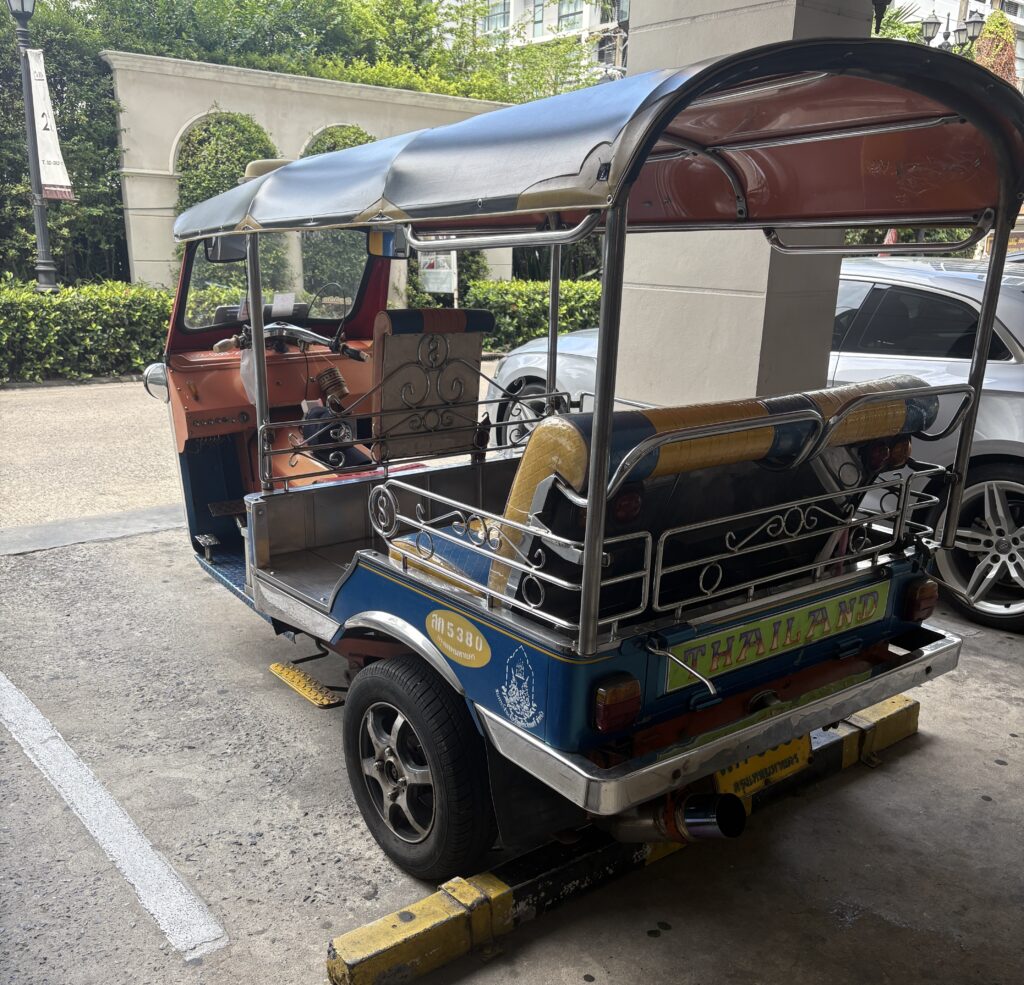
Tuk-tuks are quintessential Thailand. You’ll see them everywhere in major cities like Bangkok and Chiang Mai, and honestly, they’re fun!
There’s nothing like zipping through the streets with the wind in your hair on a hot night after a market, definitely one of my favourite things to do in Bangkok.
That said, tuk-tuk scams are some of the most common tourist traps in the country, and they come in a few variations you should know.
The first is the inflated fare scam. Tuk-tuks are already more expensive than taxis, since they’re seen as a novelty ride rather than everyday transport. But some drivers push this to the extreme, charging tourists double or triple the local rate.
Always agree on the fare before getting in, and be aware that if you’re leaving a highly touristy spot, such as the Grand Palace in Bangkok, prices will be significantly inflated.
Another is the commission shop detour. You hop in expecting a quick ride, only for the driver to start suggesting “special shops” you must visit, suit tailors, gem stores, or souvenir shops. These aren’t cultural experiences; they’re commission stops where the driver receives a cut if you make a purchase, a total waste of your trip time in Thailand!
Then there’s the “closed attraction” scam. A driver might tell you the temple or market you’re headed to is “closed for a holiday,” and instead insist on taking you somewhere else. Spoiler: it’s never closed, and you’ll end up at another tourist trap.
Bottom line: tuk-tuks are worth trying once for the experience, but they’re not a practical way to get around. Avoid catching one right outside major tourist landmarks, and if you do take a ride, always set the price up front.
Taxi Scam
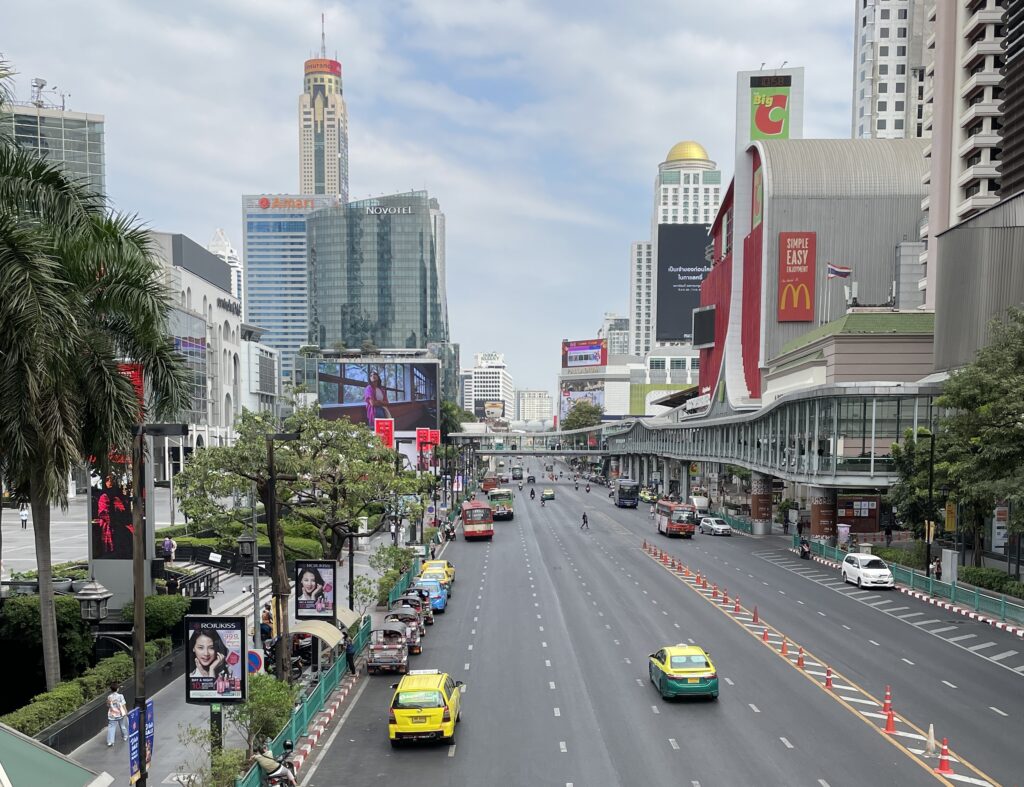
Taxis are convenient in Thailand, but they’re also one of the most common ways tourists get taken advantage of.
The classic trick is the “no meter” scam, where a driver refuses to use the meter and quotes a flat rate that’s far above the real cost. If the meter isn’t on, don’t argue, get out.
Another variation is the long-route scam, where drivers deliberately take longer paths to rack up the fare. Keep Google Maps open so they know you’re watching.
The worst is often the airport taxi scam. Inside Bangkok’s airports, touts push inflated “fixed-price” rides that look official. Skip them and head to the licensed taxi queue outside — it’s metered with only a small surcharge.
As a rule, avoid grabbing taxis right outside major tourist attractions, such as the Grand Palace or Khao San Road, where inflated prices are the norm. Walk a little further or use Grab for peace of mind.
If you want more options beyond taxis, this guide on how to get around Thailand covers everything, from trains and tuk-tuks to budget flights for your transit around the country.
Rideshare Cancellation Scam
This scam has become increasingly common, especially in Bangkok. A Grab or Bolt driver shows up for your booking and suggests you cancel the ride in the app so you can “pay less” in cash.
It sounds tempting, but here’s the catch: once you’re in the car or on the bike, the driver often demands a price that’s much higher than what the app originally quoted.
If this happens, don’t negotiate. Refuse the ride, get out, and rebook through the app.
Always stick to the platform; it locks in your fare, tracks your trip, and gives you protection if something goes wrong. If you encounter this scam, please report the driver to the platform so they can take action.
Scooter/Motorbike Rental Scam
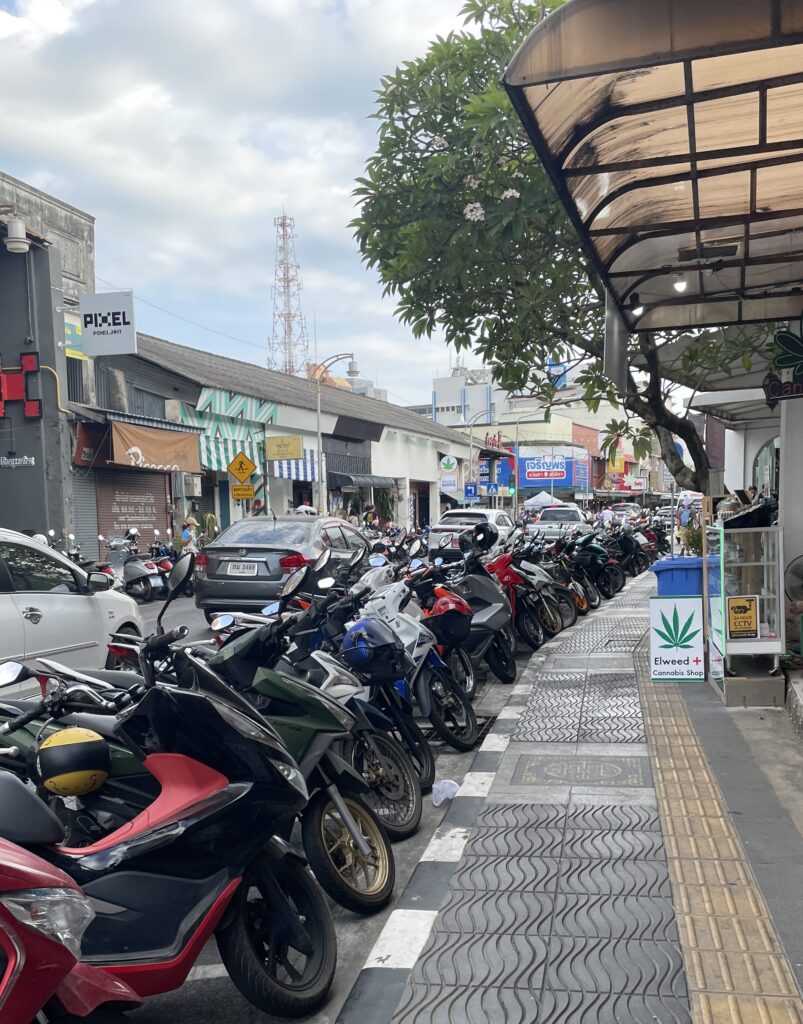
Scooter rentals are everywhere in Thailand, and for good reason; they’re cheap, fun, and give you the freedom to explore.
But with that comes one of the most common scams: being blamed for damage you didn’t cause.
The rental shop may claim scratches, dents, or broken parts were your fault, even if they were already there. In some cases, they’ll demand an inflated repair fee or even keep your passport if you left it as collateral.
To avoid this, never leave your passport as a deposit. Use cash or a photocopy of your ID instead.
Before riding, take a quick walk-around, take photos and videos of the bike, and ensure the shop acknowledges any existing damage. That way, you’re covered if they try to pull something shady when you return it.
Jet Ski Scam
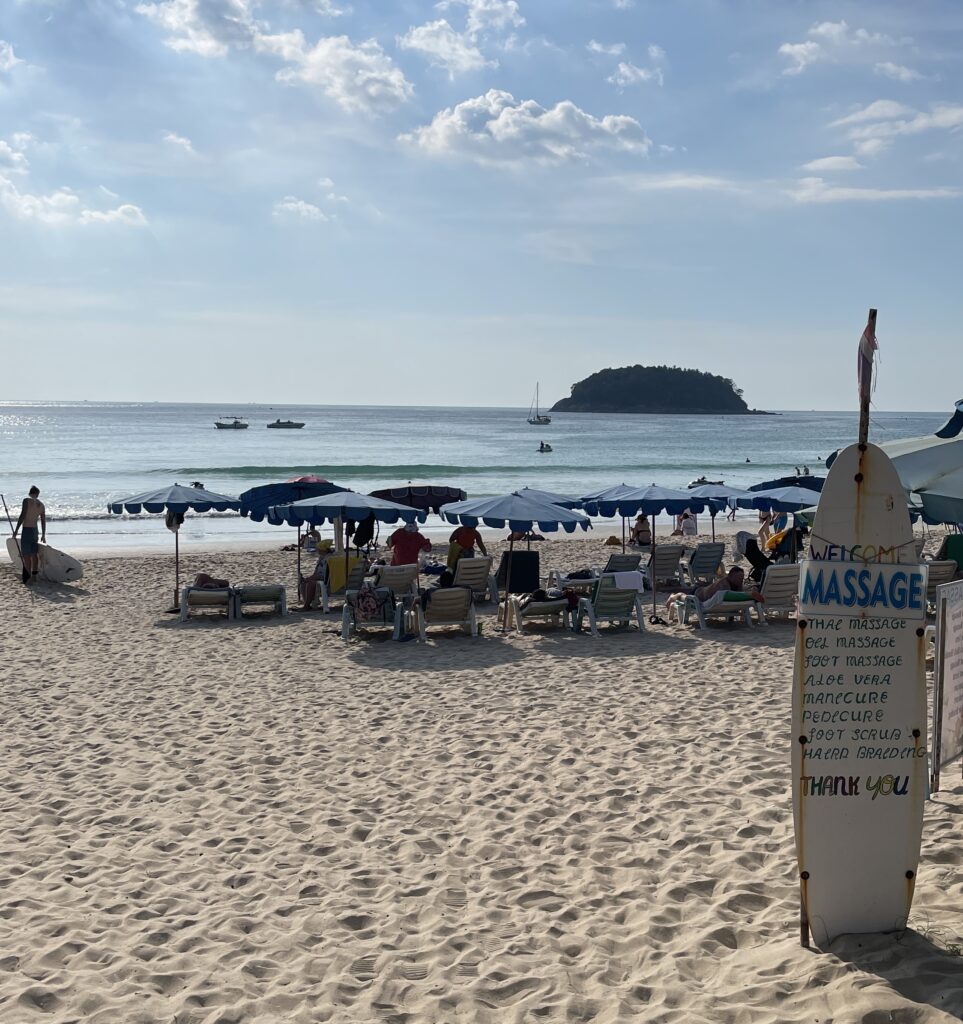
The Jet Ski Scam is infamous in Thailand, particularly in Pattaya and Phuket. It usually plays out like this: you rent a jet ski, enjoy your time, and when you return it, the owner suddenly points out “damage”, scratches, dents, or engine issues you didn’t cause.
The demanded repair fee can range from a few thousand to tens of thousands of baht.
These operators often rely on intimidation, sometimes even bringing in “witnesses” to pressure you into paying. Tourists caught off guard usually just hand over the money to avoid confrontation.
The best way to stay safe is simple: don’t rent jet skis in Thailand. If you absolutely must, only rent from reputable vendors and take detailed photos or videos before riding. However, generally speaking, this scam is so notorious that it’s not worth the risk.
Money & Payment Scams
Double Charge Card Scam
Credit card fraud isn’t rampant in Thailand, but one scam that frequently appears is the double charge scam.
It usually happens at bars, clubs, or even some tourist restaurants, where staff swipe your card twice, once for the actual bill and again for a much larger amount. Sometimes they’ll claim the first transaction “didn’t go through,” when in fact it did.
To protect yourself, always keep an eye on your card during payment. Don’t let it out of your sight, and ask for the machine to be brought to you if possible.
Double-check the receipt before signing, and monitor your account for suspicious charges. If something looks off, contact your bank immediately.
Cash is still king in Thailand, but using your card requires vigilance to avoid being taken advantage of.
Money Exchange Scam
Money exchange scams in Thailand often happen at shady booths that look official but operate outside the law.
They lure tourists in with flashy “best rates” signs, only to give far less than promised, or slip in a sleight-of-hand trick where bills vanish during the count. Sometimes they’ll even slip in counterfeit notes that are hard to notice until later.
The safest move is to always exchange money at licensed banks or reputable exchange counters, such as SuperRich.
These are well-known for fair rates and legitimacy. Avoid back-alley kiosks or anyone approaching you on the street with an “exclusive deal.” A few extra baht saved isn’t worth the risk of being scammed.
By the way, for money, I use Wise, which allows me to switch currencies in the app and withdraw from ATMs. This is how I access money as I travel full-time.
Show Your Money Scam (currency trick)
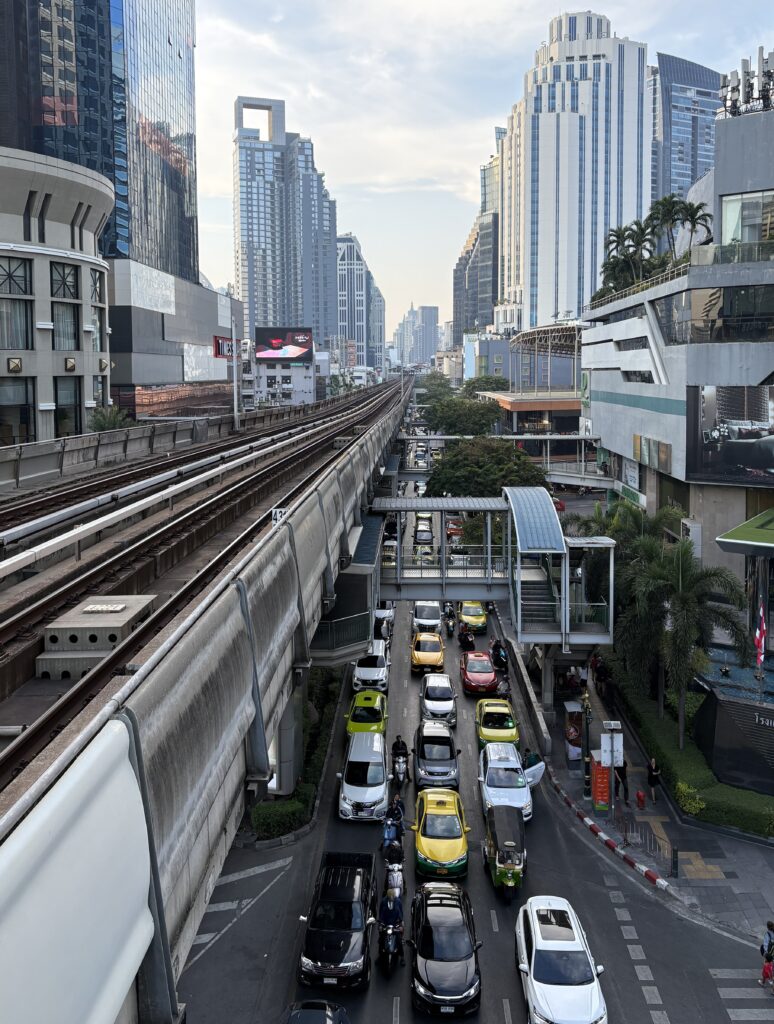
This scam plays on curiosity and friendliness. A stranger, often a foreigner themselves, will strike up small talk, asking where you’re from.
After a minute or two, they’ll say something like, “Oh, I’m visiting your country soon, can I see what your currency looks like?”
If you hand over a note, the scam becomes clear: they’ll grab it and disappear before you realize what’s happening. It’s quick, simple, and surprisingly common, especially in Bangkok.
Travelers report this most frequently around the Sukhumvit area, where scammers target tourists walking between nightlife spots.
The rule here is simple: never hand over your cash to strangers, no matter how friendly or curious they seem. If someone presses you with this request, laugh it off and walk away; you’ll save yourself the headache.
Hotel Cash Scam
This one tends to catch travelers off guard. You hand over cash at a hotel, maybe for your room bill, for extras like tours or laundry, and later, the staff claim you paid less than you actually did.
They might insist you gave a 500 baht note instead of 1,000, or that you never paid at all.
To avoid this, always pay at the front desk with clear witnesses present. Ask for a receipt immediately and keep it until you’ve checked out.
It’s also smart to break big bills before using them at hotels or small businesses, so there’s less chance of “confusion.”
Another tip: check recent Google reviews before booking. Guests often warn others if they’ve encountered shady billing practices at a particular property, helping you steer clear before it becomes your issue.
Even reputable hotels can have one dishonest staff member pulling this trick, so don’t assume higher-end places are immune. An unadorned insistence on receipts can shut this scam down before it starts.
Timeshare Scam
In popular tourist spots like Phuket and Pattaya, you’ll often see promoters handing out scratch-off tickets or telling you that you’ve won a “free prize.”
The excitement usually fades once you realize that you need to attend a lengthy timeshare presentation.
These presentations can drag on for hours, filled with high-pressure sales tactics designed to make you commit to overpriced vacation packages. Even worse, timeshares in Thailand are notoriously restrictive and extremely difficult to cancel once you’ve signed anything.
If you’re approached, save yourself the wasted time and hassle. Politely decline, walk away, and instead focus on experiences that actually add value to your trip, like following a well-planned 7-day Phuket itinerary that highlights the best beaches, markets, and viewpoints without the stress.
Nightlife & Entertainment Scams
Ping Pong Show Scam
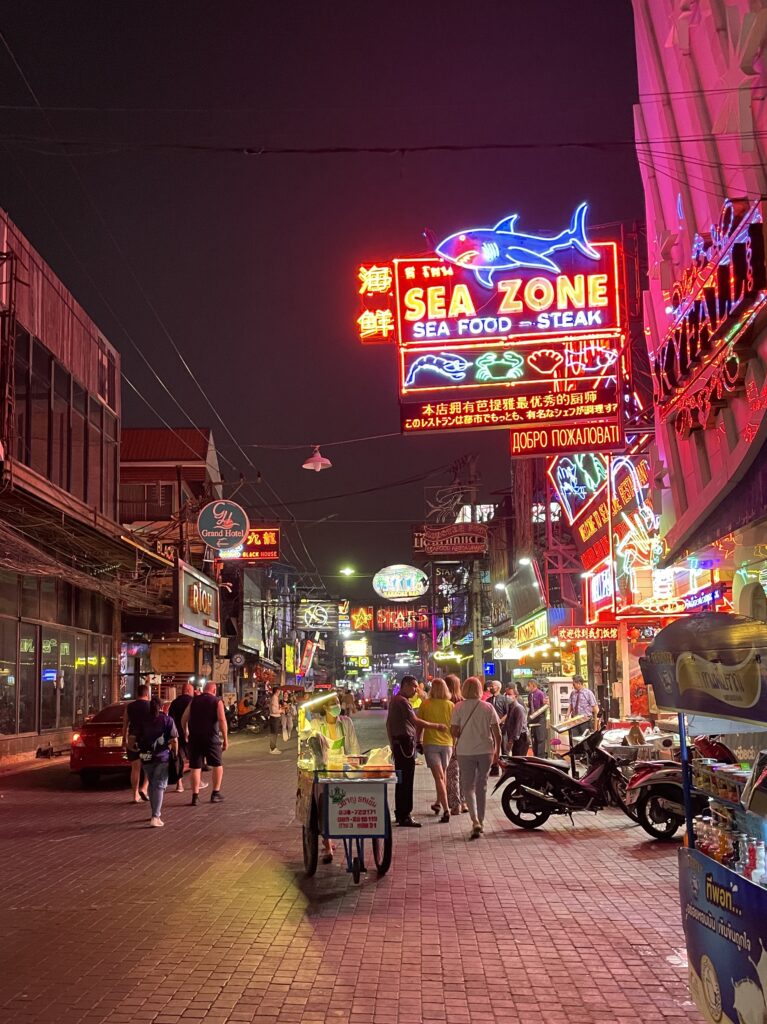
Ping pong shows are one of the most infamous tourist traps in Thailand, especially in Bangkok’s Patpong district or parts of Phuket and Pattaya. If you’re going to Pattaya, be aware of these scams in Pattaya specifically.
While they’re often advertised as quirky nightlife entertainment, what most visitors don’t realize is how quickly the costs spiral out of control.
The scam typically works as follows: promoters lure you in with promises of “free entry” or a discounted drink.
Once inside, you’ll find yourself faced with an inflated bill, sometimes hundreds of dollars, for drinks you didn’t order, hidden service fees, or “show charges” that were never mentioned up front.
Refusing to pay often results in intimidation by bouncers, making tourists feel they have no choice but to hand over the money.
If you’re curious about Thailand’s nightlife, stick to reputable bars and clubs with clear menus and upfront pricing.
Nightlife Bar Girls Scam
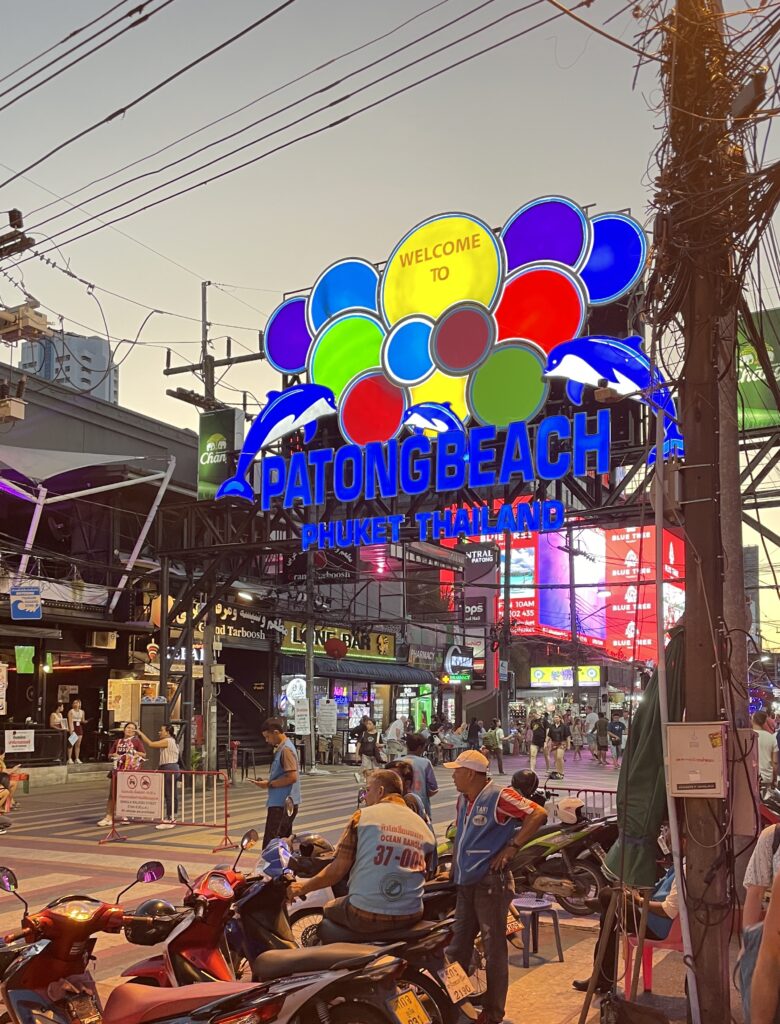
Thailand’s nightlife is legendary, with Bangkok, Pattaya, and Phuket offering an endless array of bars and entertainment. However, amid the neon lights and loud music, scams are prevalent.
One of the most typical involves bar girls who encourage tourists to keep buying them drinks. These “lady drinks” are often outrageously overpriced, sometimes costing more than your own. The more you buy, the more your bill balloons without you realizing it.
Another variation comes when you agree to spend more time with them. Suddenly, you’re hit with unexpected “bar fines,” inflated hotel charges, or other surprise fees.
The goal is simple: drain as much money from you as possible before the night is over.
Romance Scam
This is one of those scams people laugh about, but the reality is that plenty of tourists fall for it.
It often begins online, through a dating app, social media, or even by meeting someone in a bar. Things move quickly, the connection feels real, and before you know it, money becomes part of the “relationship.”
Here’s the truth: if you think you’re going to meet a bar girl and turn her into a long-term romantic partner, think again. You’re not David Blaine creating magic here.
What usually follows is a cycle of requests, stories about sick relatives, emergencies, or even the infamous “sick buffalo” excuse (yes, that’s a real thing).
Some men end up pouring thousands into these relationships, only to realize it was never about love, but about money. Keep your guard up, enjoy Thailand for what it is, but don’t become one of the many who walk straight into this costly trap.
Drunk Bill Scam
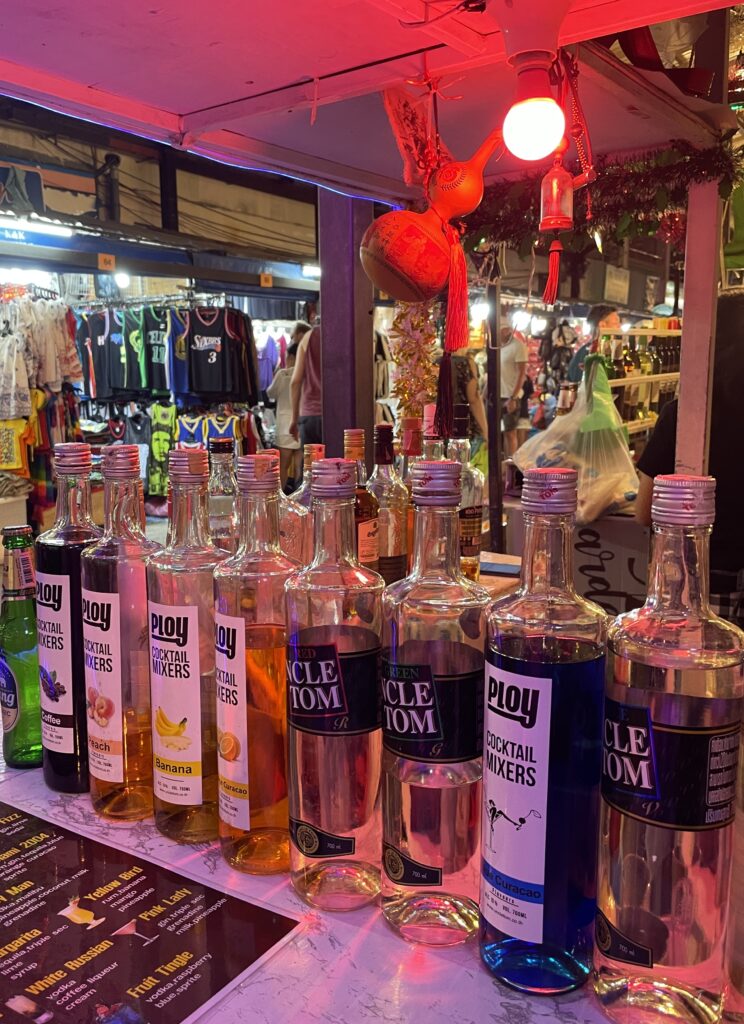
This one is particularly something to watch out for. Some bar workers take advantage of the moment they realize you’re tipsy, or sometimes even earlier.
The scam is simple: they tack on extra drinks, inflate the prices, or slip in items you never ordered. By the time the bill arrives, it’s way higher than it should be.
The best way to avoid this? Don’t run a tab at busy tourist spots like Khao San Road in Bangkok or Walking Street in Pattaya.
Pay for your drink as you order it, less room for funny business. Now, if you’re on a quiet island like Koh Lanta at a small local bar, running a tab might be fine. But in high-traffic nightlife zones, paying as you go is the safest move.
Shopping & Market Scams
Gemstone Scam
The gemstone scam is one of the longest-running scams in Thailand, and it continues to trap unsuspecting tourists every year. It usually starts with a “friendly” local striking up a conversation, sometimes outside temples or popular attractions.
They’ll casually mention that there’s a once-in-a-lifetime gemstone sale happening nearby, often claiming it’s a government-backed promotion or a special holiday discount.
If you follow along, you’ll be led to a shop where the staff puts on an elaborate show of legitimacy, complete with certificates, official-sounding guarantees, and slick presentations. The problem? The gems are either of low quality, artificially treated, or outright worthless, considering the price tag.
Tourists walk away thinking they’ve scored an incredible deal, only to find out later they’ve overpaid by thousands of dollars for jewelry they can’t resell.
The best rule of thumb: don’t buy gemstones, or any “investment” items, while traveling.
Fake Honey or Herbal Remedy Scam
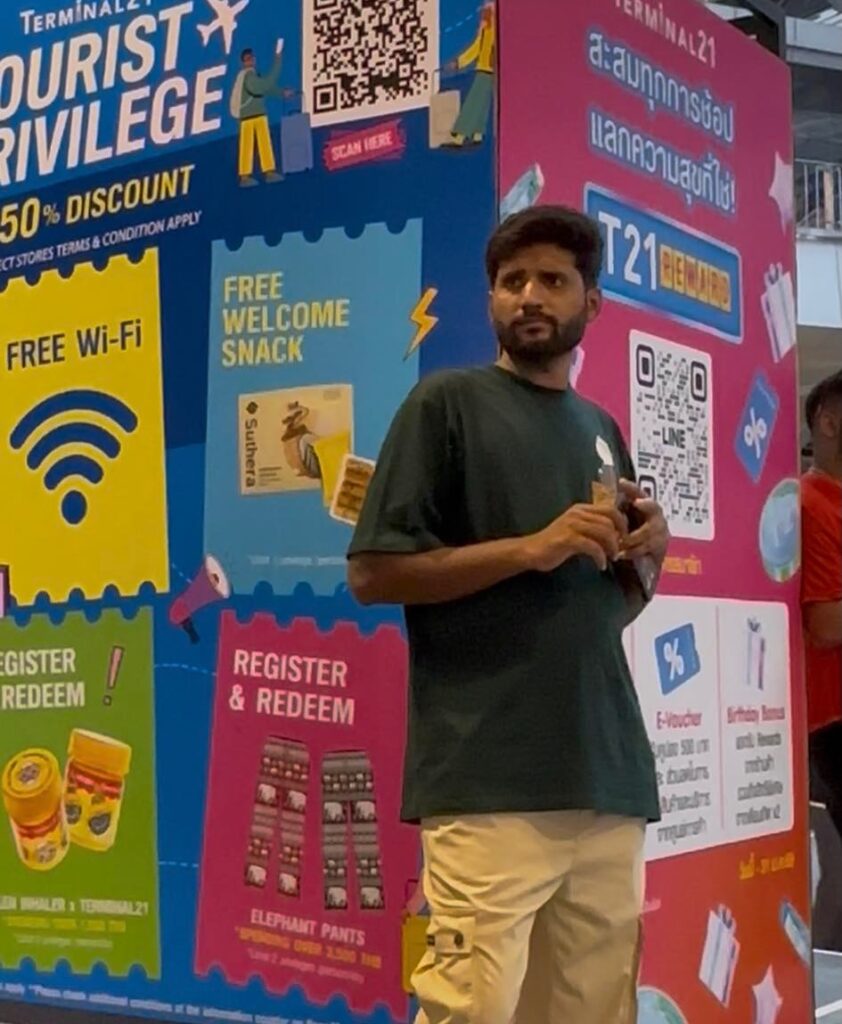
This scam frequently appears in busy markets and tourist-heavy areas. Scammers will approach you with jars of “special” honey or herbal remedies, claiming they have incredible health benefits, curing everything from fatigue to joint pain.
They’re usually persuasive, offering free samples or long-winded explanations about how their product is natural, rare, or tied to traditional medicine. Once they get your attention, the pressure ramps up.
Prices are heavily inflated, and some sellers can become pushy, trying to pressure you into making a purchase. In some instances, tourists end up being charged far more than they realized, or even feel “locked in” once the product is in their hands.
The photo you see above is from one of the many individuals perpetuating this scam in Bangkok, as shared in my Thailand Facebook group.
The reality? If you really want honey or herbal products in Thailand, you’ll find them clearly displayed in reputable shops and supermarkets at fair prices. The ones being peddled aggressively on the street or in markets are best avoided.
Grand Palace Closure / Urgent Ride Scam

This scam is almost a rite of passage around the Grand Palace in Bangkok. Here’s how it usually works: as you arrive, a tuk-tuk driver or “helpful local” approaches you quickly, sometimes almost urgently, and tells you the palace is closed.
They’ll insist it’s shut down for a ceremony, holiday, or even some vague “cleaning.”
The pushiness is the key part—they’ll often act like they’re doing you a big favor, urgently offering to whisk you away to another “better” temple instead.
The truth? The Grand Palace is rarely closed, and if you pause for even a second, you’ll notice plenty of tourists continuing to walk past you straight through the gates.
If you fall for it, you’ll end up wasting hours being driven around to smaller, less impressive temples, or worse, taken on detours to gem shops or suit stores where the driver makes commission. Either way, you lose precious time at the landmark you actually came to see.
The fix is simple: don’t take their word for it. Just ignore the chatter, keep walking toward the palace entrance, and you’ll see for yourself that it’s open.
By the way, peek at my 4-day Bangkok itinerary for many more activities to consider beyond the Grand Palace.
Fake Ticket Assistance Scam
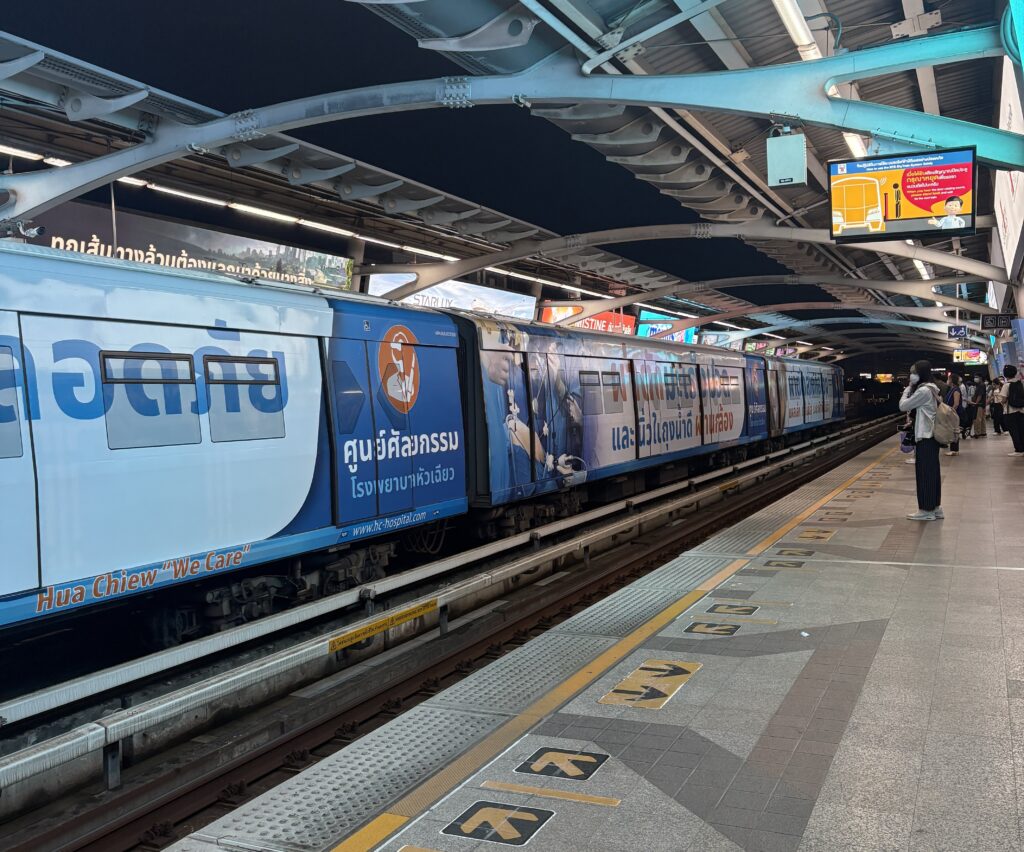
This one usually targets tourists at train stations, bus terminals, or even ferry ports. A stranger approaches, pretending to be helpful, and offers to assist you with buying a ticket.
They might guide you to a machine, insist on pressing the buttons for you, or take you to a “special” counter that isn’t official at all.
The trick? They’ll manipulate the process, either charging you more than the real price, pocketing the difference, or even selling you a completely fake ticket that won’t be honored when you board. In some cases, they’ll tack on hidden “service fees” that don’t exist.
What makes this scam tricky is that the scammers often act confident and official, making it feel like they’re just saving you time. But if you hand over cash, you’ll likely never see it again.
The safe move: always buy tickets directly from the official counter, machine, or trusted platforms like 12Go Asia. If someone suddenly insists on helping you, especially without being prompted, it’s a red flag to step back and handle it yourself.
Street & Landmark Scams
Sukhumvit Street Scams (shady men approaching tourists)
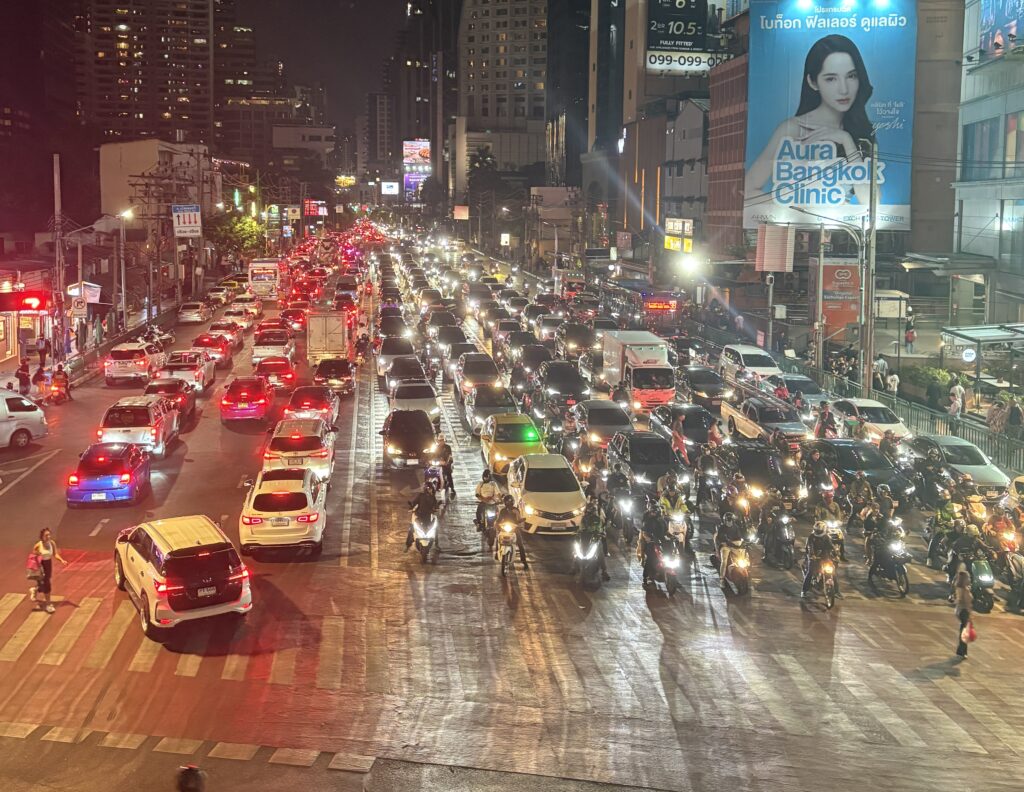
If you’re spending time in Bangkok, especially around Sukhumvit, you’ll quickly notice the area is full of nightlife, hotels, and shopping malls.
But along with that comes a reputation for shady approaches on the street. Areas like Nana Plaza, Asok, and Phrom Phong are notorious for men hanging around and trying to rope tourists into all sorts of things.
In my own months living in Bangkok, I’ve been approached more times than I can count, often by groups of men, usually from Nigeria, India, Pakistan, or Bangladesh.
The offers vary: sometimes it’s goods, sometimes “friendly” small talk that leads into a scam, and sometimes things you don’t even want to know about.
The rule here is simple: nothing good comes from engaging. If you’re approached, say “no thank you,” put your hand up if necessary, and keep walking.
Don’t get pulled into a conversation; it’s a waste of your time at best, and at worst, it could end with you being scammed or dragged into something unsafe.
Temple or Attraction is Closed Scam
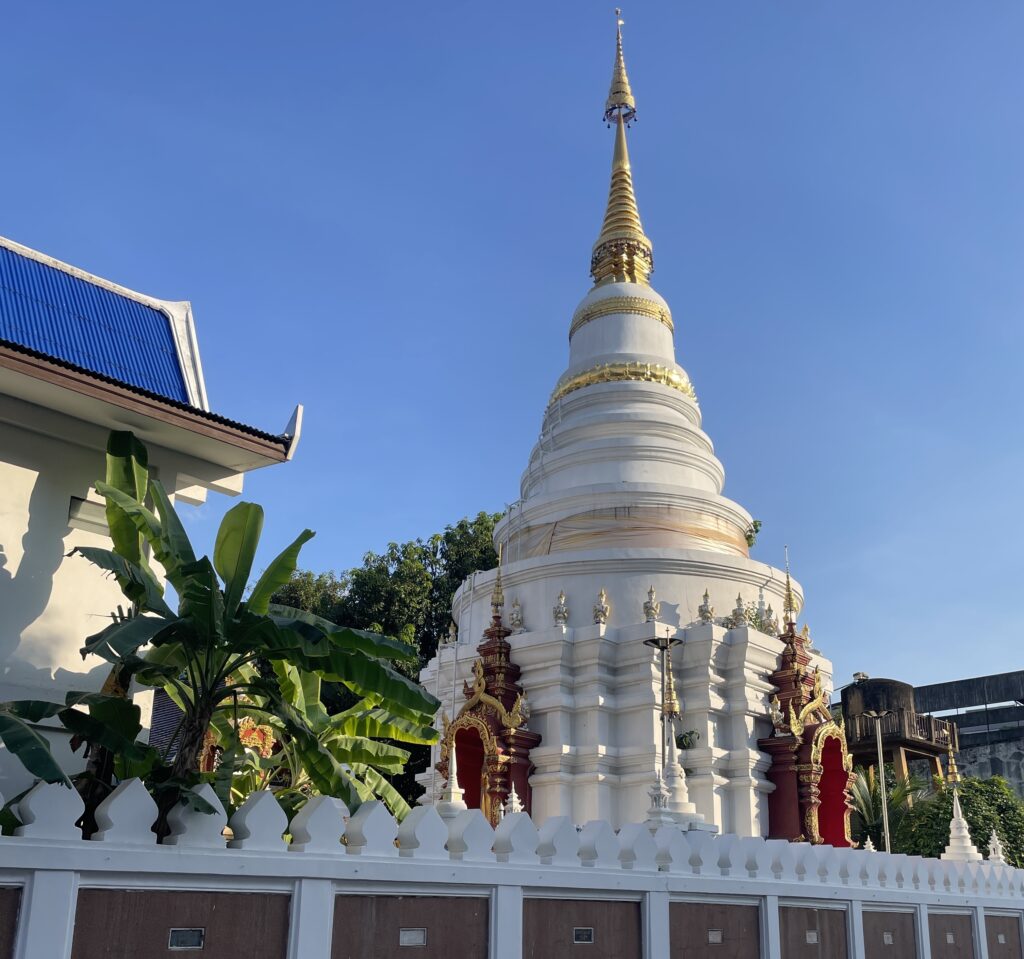
This scam is a classic, and it’s not limited to the Grand Palace. It can happen at just about any major tourist attraction in Thailand.
The setup is simple: you’re on your way to visit a famous temple or landmark, and someone, whether it’s a tuk-tuk driver, a taxi driver, or even a seemingly friendly local, tells you that the attraction is “closed for the day.”
The next step is predictable. They quickly offer to take you somewhere “better,” or they’ll connect you with a driver ready to whisk you off to a different spot.
In reality, the temple or attraction is open as usual, and what’s really happening is a ploy to divert you elsewhere, often a shop, tailor, or gem store where they’ll earn a commission.
Unless you’ve confirmed it on Google or heard it directly from someone you trust, don’t believe anyone who says a temple or attraction is closed. Walk past, check for yourself, and you’ll almost always find plenty of other tourists streaming right inside.
Fake Tour Guide Scam
This scam preys on tourists who are open to chatting with locals. It often starts with a friendly stranger striking up a conversation near a temple or popular landmark.
They might begin pointing things out, giving you background information, and before you know it, they’re acting like your personal guide.
At first, it feels harmless, maybe even helpful, but after 20 minutes or so, they’ll demand payment for their “services.” In some cases, they’ll lead you into overpriced tuk-tuks or shops where commissions are waiting for them.
The key thing to remember: real guides are licensed, official, and clearly identified. If someone suddenly decides to be your guide out of nowhere, politely decline and move on.
Consider downloading GetYourGuide, among other apps for Thailand, to make your travel experience go smoothly.
Freeing Birds Scam
In many temple areas across Thailand, you’ll see people offering you the chance to release caged birds as a symbolic act of merit or good luck. While the idea might sound wholesome, it’s a complete scam.
The birds are often caught and explicitly caged for this purpose, only to be released and captured again later. Not only does this exploit both tourists and animals, but it also supports a cruel cycle.
If you’d like to make a merit or support local communities, consider donating directly to the temple or participating in other ethical and cultural activities. Avoid this scam entirely; it’s harmful and disingenuous.
Pickpocketing & Personal Safety
Pickpocketing Scam
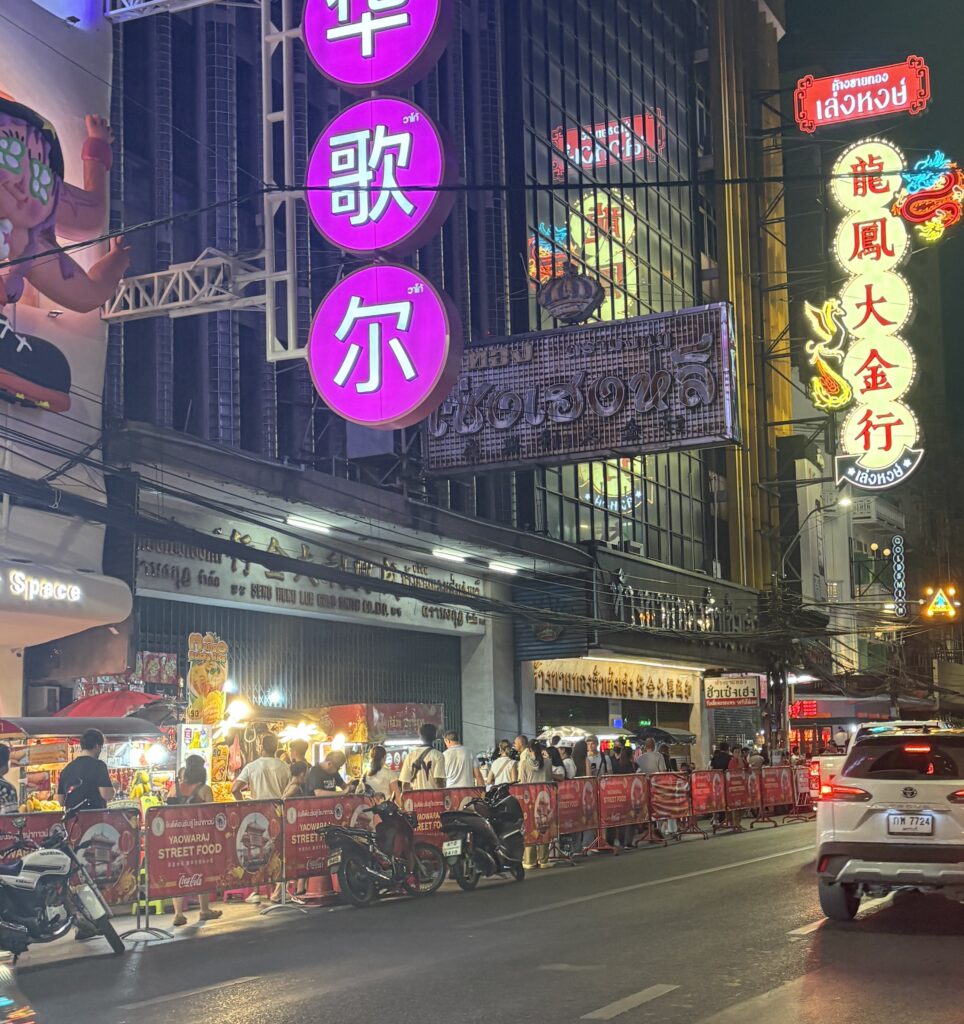
Pickpocketing is one of the oldest tricks in the book, and in Thailand, it’s no different. Crowded areas, such as night markets, walking streets in Pattaya, or packed public transportation, are the prime hunting grounds.
Scammers work in teams; one distracts you while the other slips your phone, wallet, or passport out of your pocket or bag. Sometimes the setup is as simple as someone “accidentally” bumping into you while an accomplice does the grab.
The fix? Keep your bag zipped, wear it across your body, and never carry valuables in your back pocket. Stay alert in busy areas, and you’ll likely avoid becoming a target.
Blame-the-Accident Scam
This scam is more aggressive and stressful than most. It usually happens on the road: a motorbike might deliberately brush against you or your scooter, and the rider will immediately accuse you of causing damage or injury.
They’ll then demand cash compensation on the spot, sometimes loudly and in a way that pressures you into paying just to avoid escalating the scene.
Another version of this is someone purposely bumping into you on the street and dropping their phone, then claiming you’ve caused damage and demanding payment.
If this happens, don’t hand over money right away. Stay calm, get to a safe public area, and, if necessary, involve the local police. Most scammers back down when they realize you’re not going to cave in so easily.
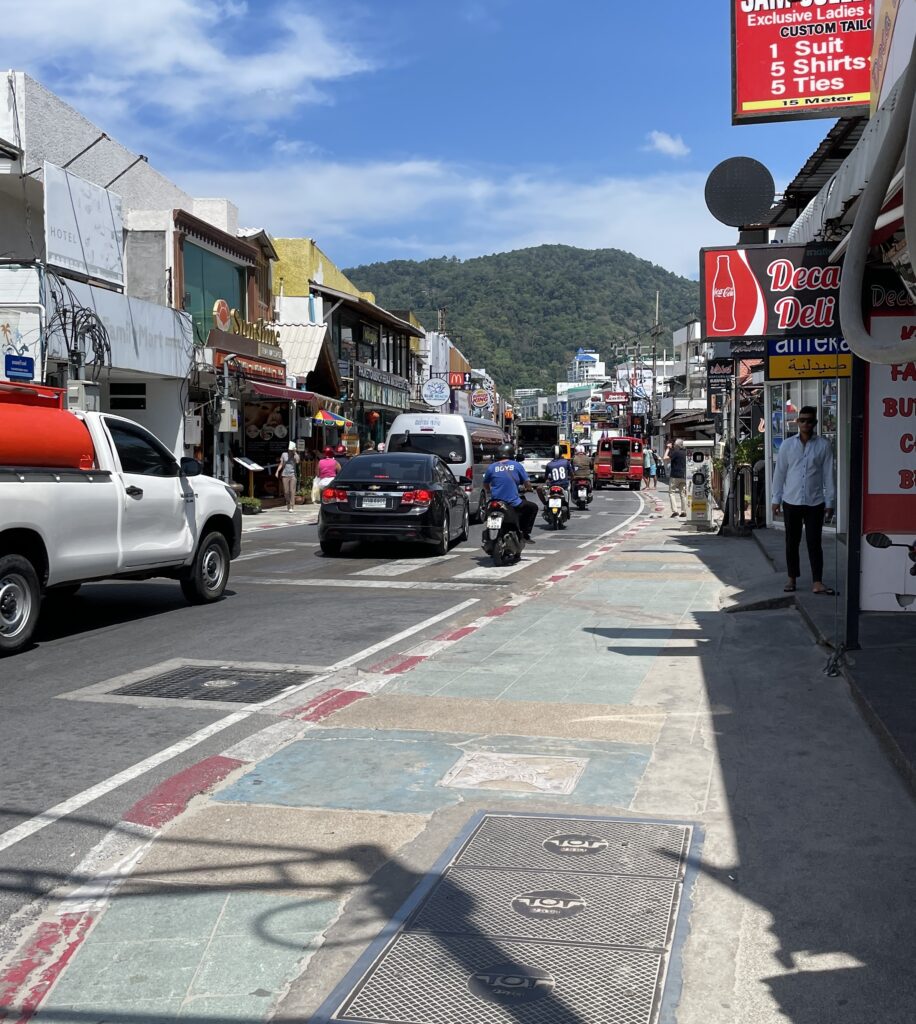
Final Thoughts on Common Scams in Thailand
As you read through this list, don’t fall into the trap of thinking Thailand is overrun with scams. The truth is, scams exist everywhere in the world.
The reason they receive so much attention here is that Thailand is one of the most visited countries in the world, ranking in the top 10 globally, which naturally makes it a hotspot for opportunists.
Like many common tourist mistakes in Thailand, most scams are easy to sidestep once you know what to look for. And if you’re already budgeting your Thailand vacation, being aware of these tricks is one more way to protect both your plans and your wallet.
As I mentioned earlier, not all of these scams originate from locals; foreigners also carry out many of them. At the end of the day, Thailand is an incredible country filled with generous, friendly, and welcoming people. A few bad actors shouldn’t overshadow that.
With just a bit of awareness and a few simple precautions, your travels here should be smooth and stress-free.
And if something ever does happen, Thailand has an English-speaking tourist police division dedicated to assisting visitors. You can reach them by dialing 1155 anywhere in the country.
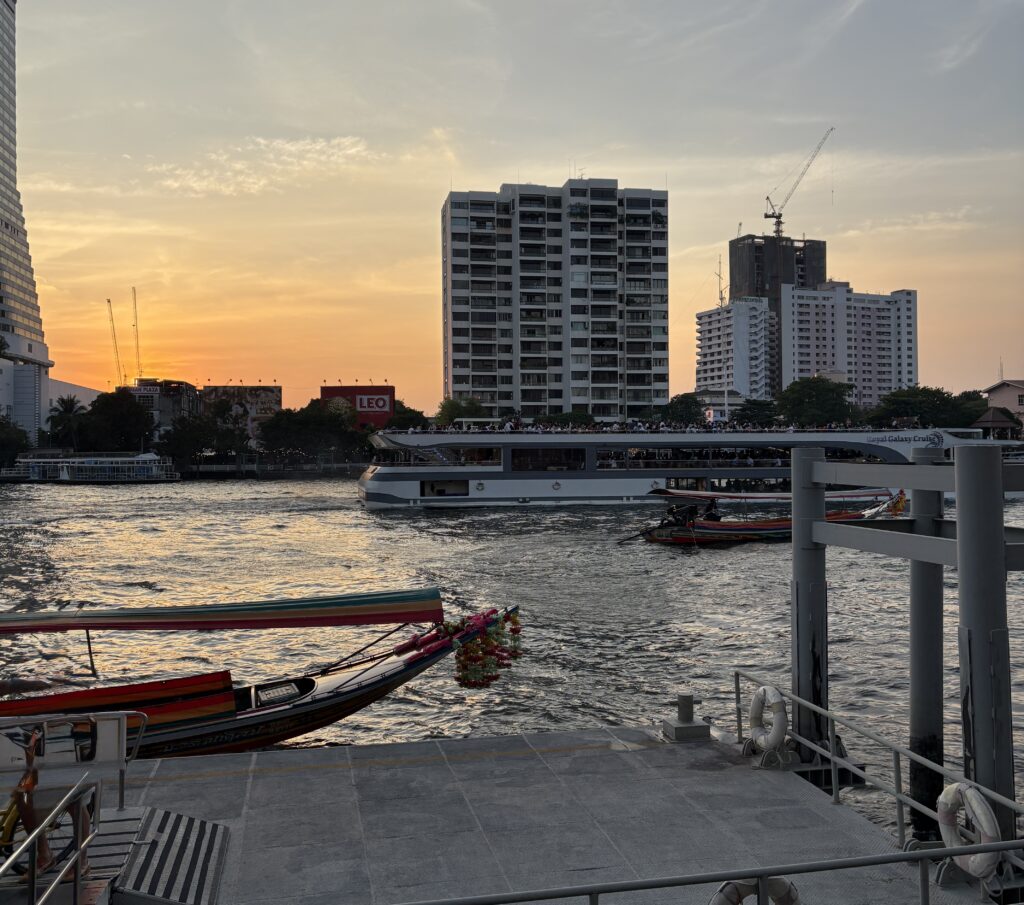
What are the most common scams in Thailand?
Tuk-tuk and taxi overcharging, jet ski rentals, fake tour guides, and inflated bar bills are some of the most common scams in Thailand.
How do I avoid scams in Thailand?
Agree on prices upfront, use apps like Grab or 12Go, and avoid pushy offers from strangers in tourist areas.
Is Thailand safe despite the scams?
Yes, Thailand is generally safe to visit; most scams are petty and involve money. Thailand is safe for travelers, and you can call the tourist police at 1155 if needed.
Are scams in Thailand only targeting tourists?
Mostly, yes. Tourists are easier targets, but scams don’t reflect the majority of locals, who are welcoming and honest.

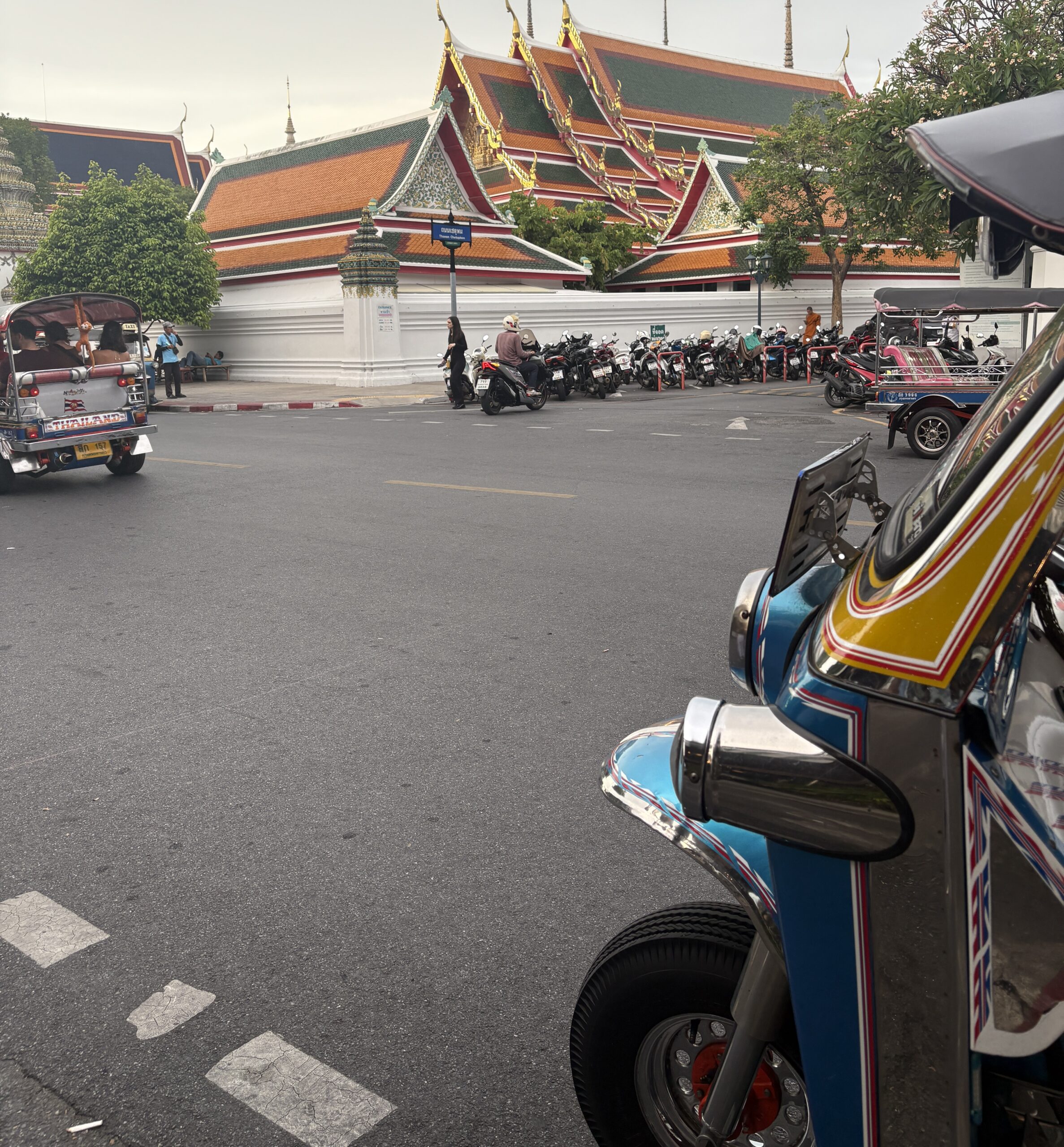
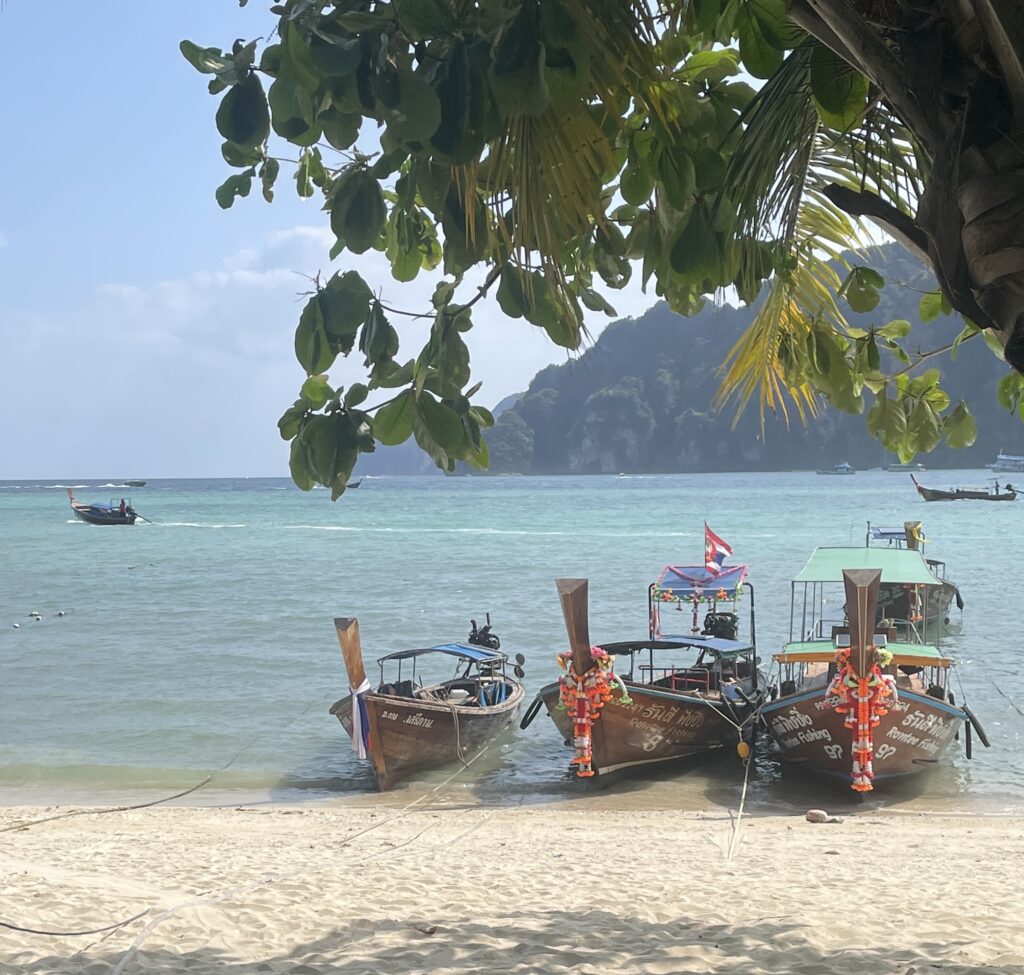
nice and informative read
Thank you for your kind words Gill!
Thank you. V helpful. Could you write more about tours / excursions. I found them so expensive whether via Get your guide App or on street kiosks. Eg £85 (gbp) to visit any of the islands £65 to visit elephant sanctuary. It just became unaffordable to do more than 1 a week. Thanks
Hello Cara thank you for your kind words. Have you tried going to the local tour booths? They can be slightly more affordable at times however my best advice is to do less excursions and explore more. Mix your trip up with DIY days and some with excursion days!
Also the local currency in Thailand has had quite the prominent hold in value so that’s been a factor as well!